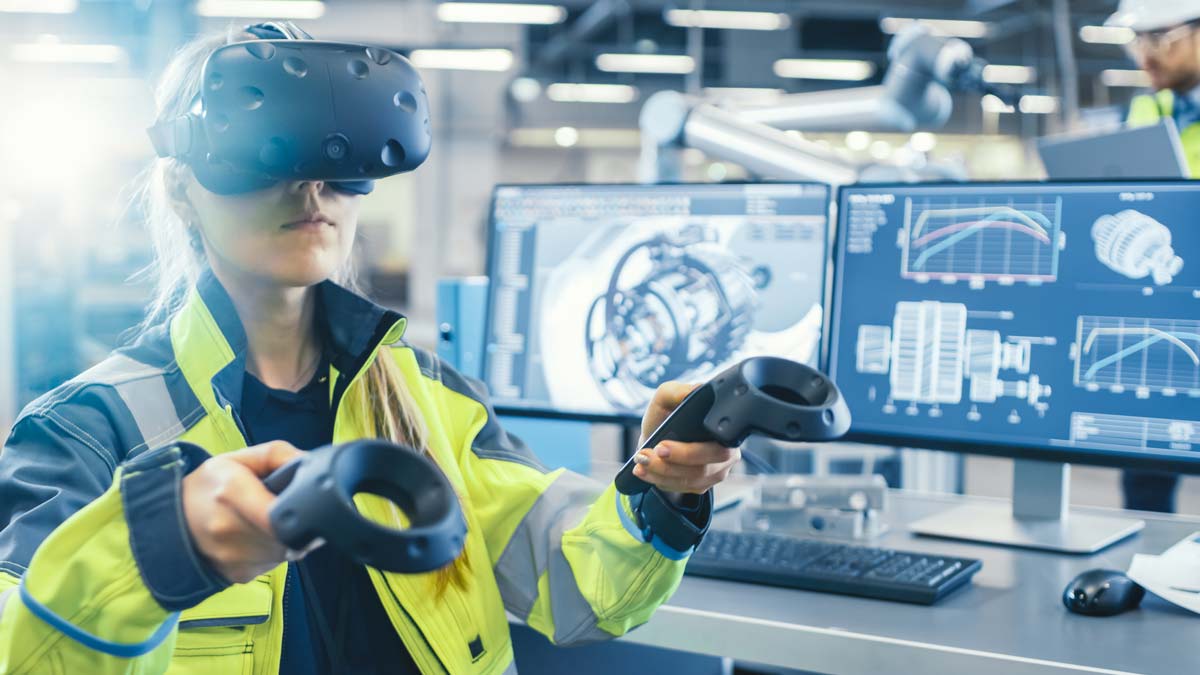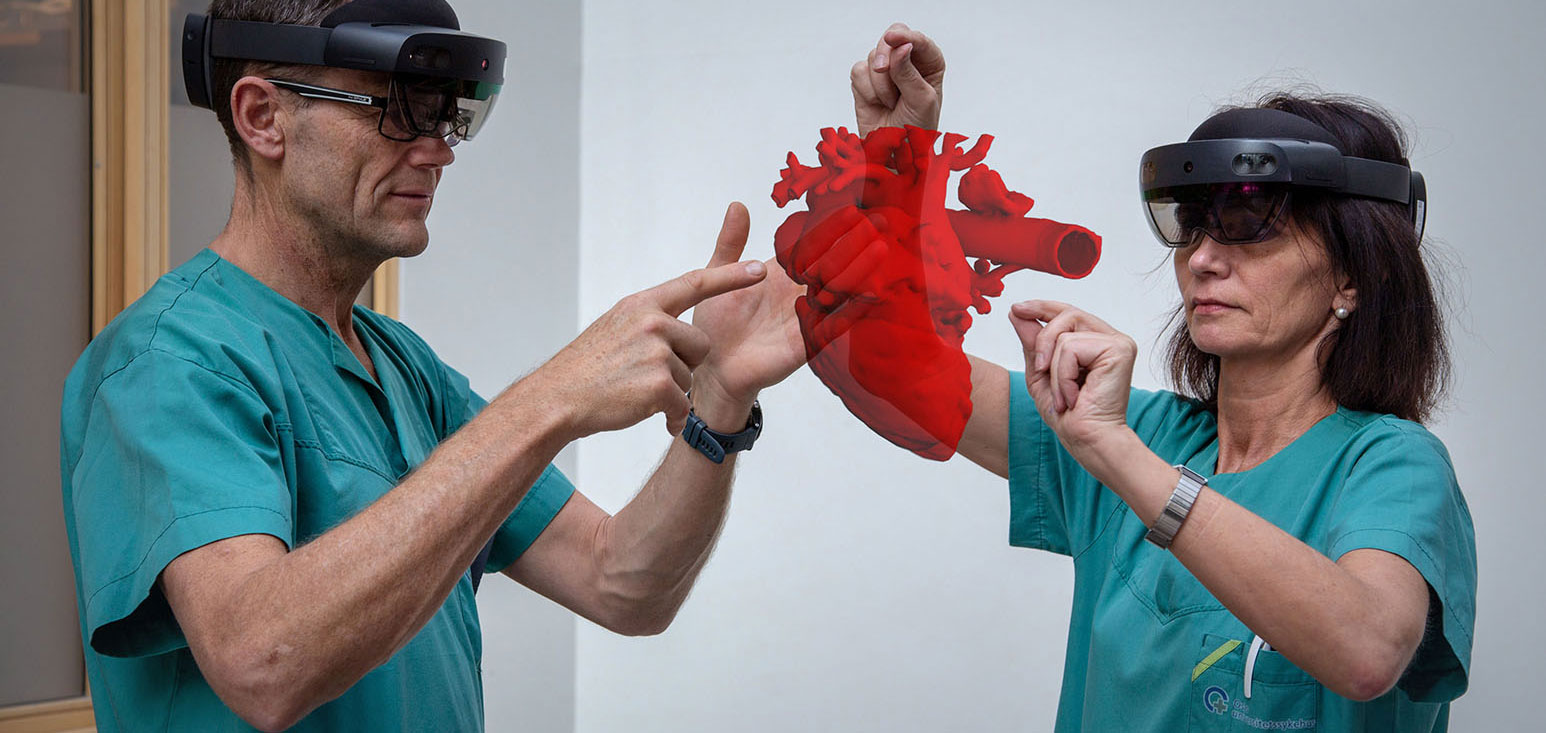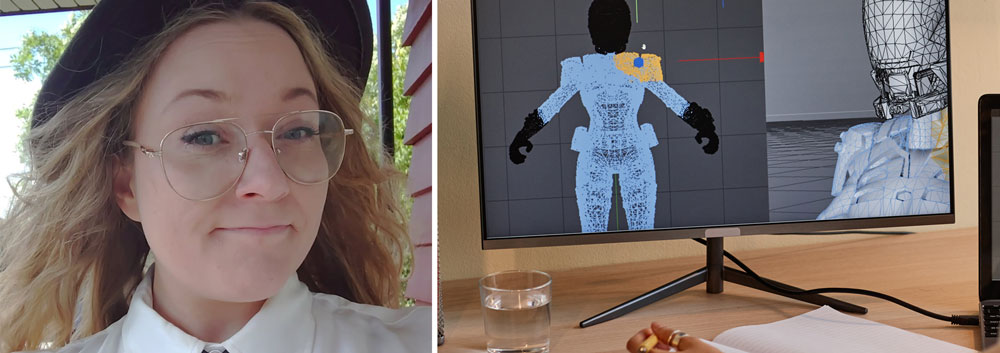Online Studies 2 years* Higher Professional Degree
XR Development is a technology education focused on Extended Reality. The program prepares you for jobs in Virtual Reality (VR), Augmented Reality (AR) and Mixed Reality (MR).
Apply now
Extended Reality (XR) refers to the platforms of Virtual Reality (VR), Augmented Reality (AR) and Mixed Reality (MR). XR technology merges the physical world to the virtual world and opens new possibilities for immersive experiences.
Become an XR Developer
This education focuses on the development of practical skills in all aspects of the XR development area, with special emphasis on the role as a programmer and VR/AR developer. The main objective of the study program is to provide students with practical and relevant training within XR development, so that you are ready for employment immediately after graduating.
XR is important because it is about moving computing into the physical world.Scott Leaman, Mixed Reality Lead, Sopra Steria Norway
Bli klar for en fremtidsrettet jobb
XR Development is an applied higher professional degree education. The program provides competence to develop applications and solutions for Virtual Reality (VR), Augmented Reality (AR), and Mixed Reality (MR) platforms. Students explore user experiences and user behaviour to create optimized and user-centric applications in addition to interactive functionality through the use of current technology. The exam projects at the end of each year allow students to be part of an industry related project, or internship, to better prepare them for the working life.
The field of XR is in rapid development and is transforming business across many industries including science, media and entertainment, visualization, marketing, education, healthcare and many more. The demand for competent XR developers within the field is increasing fast.

Studiets oppbygging
The first years kicks off with XR Foundations, which introduces the technology, and continues with Real-Time Rendering which introduces Game Engines and content creation. Next is Basic Math for XR, focusing on mathematical concepts related to interactive 3D and programming. It continues with Programming Foundations, focusing on visual scripting in a game engine. The course in VR Development teaches you to develop applications for Virtual Reality (VR) platforms, and Programming focuses on C# skills.
The year continues with Project Management, before UX Foundations introduces design guidelines for XR devices through User Experience and Design Thinking. Mobile AR Development focuses on applications aimed at mobile Augmented Reality (AR) platforms. The first year ends with a practical project exam.
The second year starts with Advanced Math for XR, before Advanced Programming goes into tree data structures and path-finding algorithms, in addition to JSON and XML. The semester continues with UX - Usability Testing before MR Development teaches you to develop applications aimed at Mixed Reality (MR) platforms.
We then move on to Startup Bootcamp where students learn to develop, form and pitch a prototype for a business idea, before XR Innovation teaches applied skills for designing and developing innovative prototypes for XR applications. The second year is concluded with a large practical project exam and a portfolio.
Courses covered during the first year of study:
- XR Foundations
- Real-Time Rendering
- Basic Math for XR
- Programming Foundations
- VR Development
- Programming
- Project Management
- UX Foundations
- Mobile AR Development
- Project Exam 1
Courses covered during the second year of study:
- Advanced Math for XR
- Advanced Programming
- UX - Usability Testing
- MR Development
- Startup Bootcamp
- XR Innovation
- Project Exam 2
- Portfolio
Year 1
The Candidate…
- has knowledge of workflows, tools and processes for design, prototyping and production techniques that are used in 3D graphics and real-time rendering for Virtual Reality and mobile Augmented Reality
- has knowledge of basic mathematical concepts and processes that are used in 3D graphics and programming
- has knowledge of general principles of computing, object-oriented programming, tools and processes for visual scripting and basic C# programming that are used in XR development
- has knowledge of professional project management methodologies, frameworks, tools and version control systems that are used in the software development industry
- has insight into Human Computer Interaction (HCI), User Experience (UX) design, ethics and its relevance for XR development
- has insight into performance considerations relevant for developing optimised VR/AR applications
- has knowledge of XR technologies, devices, frameworks and terminology and is familiar with the industry and the history of Extended Reality
- can update his/her knowledge within VR/AR development
- understands the importance of the XR discipline in a societal and value-creation perspective
- can apply knowledge of mathematical concepts to solve 3D graphics and programming related problems
- can apply knowledge of programming to code functionality in VR and mobile AR applications
- can apply knowledge HCI and UX design for ensuring good user experiences in XR applications
- masters workflows, relevant tools and processes for 3D graphics and real-time rendering and implementation of content in a game engine
- masters relevant tools and techniques for programming with visual scripting and C#
- masters relevant methods, processes and tools for project management and version control
- can find information and material related to VR and mobile AR development that is relevant to a project and/or issue
- can study implemented content and code and identify performance-related issues and what measures need to be implemented for developing optimised VR/AR applications
- understands the ethical principles and practices that apply in the field of XR development
- has developed an ethical attitude in relation to project execution, user experiences and customer relations
- can carry out development using professional project management methodologies, relevant frameworks and version control systems
- can carry out debugging and code optimisations based on performance considerations in visual scripts and C#
- can build relations with his/her peers, also across discipline boundaries to share knowledge, material and collaborate on projects
- can develop Virtual Reality and mobile Augmented Reality applications, alone or as part of a group
Year 2
The Candidate…
- has knowledge of advanced mathematical concepts and processes that are used in 3D graphics and programming
- has knowledge of advanced C# programming principles, relevant API’s and integration methods that are used in XR development
- has knowledge of Mixed Reality technology and methods, processes and tools that are used for planning, designing, developing and deploying MR prototypes and applications
- can assess his/her own rapid prototypes in relation to design thinking and design sprint methodology
- can assess his/her own work and XR solutions in relation to applicable regulations, quality requirements, usability and design guidelines
- is familiar with concepts, processes and tools that are used to develop business ideas and starting a business
- has insight into his/her own opportunities for development and innovation in the field of XR
- masters relevant tools and techniques to integrate API’s for extending the functionality of XR applications
- masters methods, processes and tools that are used for planning, designing, developing and deploying MR prototypes and applications
- can explain his/her ideas, concepts and main processes related to business idea development
- can explain his/her choice of design methodology and processes for rapid prototyping and application development
- can reflect over his/her own mathematical practice and adjust it under supervision
- can reflect over his/her own programming practice and adjust it under supervision
- can reflect over his/her own usability testing and explain choices in relation to UX design, and adjust it under supervision
- can find and refer to information and material related to project work, development and assess its relevance to a specified project
- can plan and carry out the development of XR projects and interactive immersive solutions, alone or as part of a group, in accordance with ethical requirements and guidelines for user experience design
- can exchange points of view with industry professionals and participate in discussions about best practices within XR development
- can contribute to the development of innovative XR products and solutions aimed at societal challenges
- can contribute to development in real-world projects
The field of XR is developing incredibly fast. We need people who understand the user experience and have good skills in designing solutions. Keith Mellingen, Rainfall
Jobbmuligheter
Graduates will be able to work in companies that specialise in developing applications and products aimed at VR and mobile AR platforms - MR devices and XR solutions- , such as product visualisations, training and educational applications, simulators, games and other immersive interactive experiences. Companies are currently adapting as technology is changing rapidly. Current job titles after graduating can be VR Developer, Mobile AR Developer, Game Programmer, MR Developer or C# Developer.









